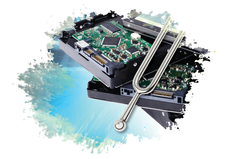Speeding up slow disks with SSD caching
Afterburner

Flash memory is fast but also expensive. Caching with Flash provides a way out: A smaller and cheaper SSD can speed up the disk.
Hard disks are inexpensive, and they have huge capacities, but they are also slow. Solid state disks (SSDs) are fast, but smaller and more expensive. If you combine the advantages of a hard disk with an SSD-based cache, you pick up a large performance gain at a reasonable cost.
An application generally does not want all the data at once; most of the data is in the state of being ignored most of the time. Caching lets you move the most frequently requested data to an exclusive, fast medium and leave the less-frequently accessed data on the cheaper but slower background medium.
The Linux environment has several tools that provide the necessary software to support hard-disk caching. Does it help to use an SSD-based flash drive as a cache for a traditional hard disk? We decided to find out. This article explores the possibilities for caching with the Linux caching tools Enhance IO and dm-cache. If you are new to the topic of caching, and you would like some additional information on choices you might have to make, see the boxes titled "A Little Cache Theory" and "How Flash Works."
[...]
Buy this article as PDF
(incl. VAT)